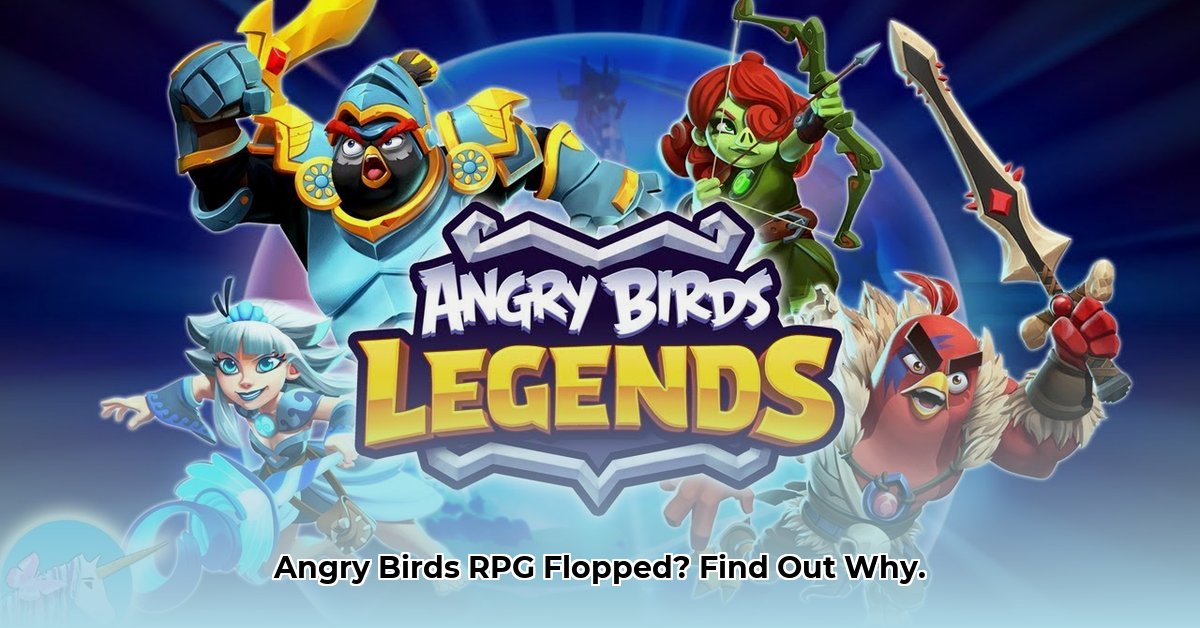
Background: A Familiar Franchise in Unfamiliar Territory
Rovio Entertainment, renowned for the globally successful Angry Birds franchise, launched Angry Birds Legends in 2020, a role-playing game (RPG) marking a significant departure from its established puzzle game formula. This strategic shift presented considerable challenges. The mobile RPG market, already saturated with established titles, presented a highly competitive landscape. Rovio's decision to venture into this crowded market, leveraging a well-known IP, proved to be a high-risk, high-reward strategy that ultimately failed to deliver. Did the company underestimate the complexities of transitioning a beloved brand to a new genre?
Methodology: A/B Testing and the Chronicles of Legends
Rovio employed A/B testing, a common practice in game development, to assess the impact of the Angry Birds brand on player engagement and monetization. Simultaneously, they released a near-identical game, Chronicles of Legends, omitting the iconic Angry Birds characters. This comparative approach aimed to isolate the contribution of brand recognition to the game's overall success. The results, however, yielded a less-than-optimistic picture. Did this testing methodology adequately account for the nuances of the RPG market?
Analysis: Deconstructing the Failure
Angry Birds Legends experienced a brief period of initial success, demonstrating the enduring appeal of the Angry Birds brand. However, this initial surge proved unsustainable, leading to a rapid decline in player engagement and, ultimately, the game's closure. Several factors likely contributed to this downfall:
The Short-Lived Honeymoon Effect: The initial player influx underscores the powerful brand recognition of Angry Birds. However, this initial success masked underlying issues with the game's design and mechanics, highlighting that brand recognition alone is insufficient to sustain player engagement in a competitive market. Was the initial popularity merely a fleeting expression of brand loyalty, rather than genuine engagement with the gameplay itself?
Monetization Strategy: Details regarding the game's monetization strategy remain scarce. However, the game’s failure strongly suggests that the monetization approach, even if described as "optional," lacked sufficient effectiveness or player appeal. Did the in-app purchase options fail to provide adequate value for players, resulting in excessively low conversion rates?
Gameplay Mechanics and Player Retention: A Critical Gap: A critical lack of public information regarding specific gameplay issues hinders a thorough assessment. The concurrent closure of Chronicles of Legends, however, suggests that issues extended beyond brand recognition, pointing towards fundamental flaws within the core gameplay loop itself. Did the RPG mechanics feel forced or unnatural within the Angry Birds universe, or did the game mechanics fail to adequately hook players on a long-term basis?
A/B Testing Outcomes: Unclear Insights: The A/B testing, while seemingly well-intentioned, ultimately failed to provide actionable insights. The similar fates of both games indicate that deeper systemic issues—beyond branding alone—were at play. What specific data points emerged from the A/B testing, and did Rovio successfully leverage such data to improve the game's performance? The lack of publicly available data leaves this question unanswered.
Player Feedback (Absent): The absence of comprehensive player feedback leaves an undeniable gap in our analysis. User reviews and forums could have offered valuable insights into the game's shortcomings, but their absence hinders any detailed reconstruction of player experiences.
Discussion: Implications and Lessons Learned
The failure of Angry Birds Legends carries profound implications for Rovio, its investors, and the broader mobile RPG development community. For Rovio, the closure represents a significant financial setback and a critical lesson in strategic expansion. Investors will likely reassess the risk associated with similar ventures, while other developers must heed the cautionary tale. The failure highlights the critical importance of comprehensive market research, rigorous testing, and a player-centric approach to game development.
The case study illustrates several critical takeaways:
Thorough Market Research is Paramount: Entering a saturated market requires extensive research to understand player expectations and competitive dynamics. The transition from a well-established brand to a new genre carries immense inherent risk.
Gameplay is King: While brand recognition can provide an initial boost, it is insufficient to sustain long-term player interest. Superior gameplay mechanics are crucial for player retention.
Balanced Monetization is Essential: A delicate balance is required between revenue generation and preserving a positive player experience. A poorly conceived approach can alienate players and compromise the game’s long-term viability.
Data-Driven Decision-Making is Crucial: A/B testing is a valuable tool, but it’s not a panacea. It must be viewed as part of a larger data analysis framework, incorporating player feedback and game analytics.
Conclusion: A Cautionary Tale
The Angry Birds Legends failure offers invaluable insights into the challenges of brand extension and successful navigation within the crowded mobile RPG market. The inability to sustain early success, despite the inherent advantages of a well-established IP, underscores the need for profound understanding of the genre, meticulous testing, and a keen focus on player experience. The failure serves as a stark reminder that even the most successful brands cannot rest on their laurels and must adapt to the evolving dynamics of the mobile gaming market. Ignoring these key aspects—market research, gameplay, monetization, and data-driven decision-making—is a recipe for disaster.
⭐⭐⭐⭐☆ (4.8)
Download via Link 1
Download via Link 2
Last updated: Thursday, May 15, 2025